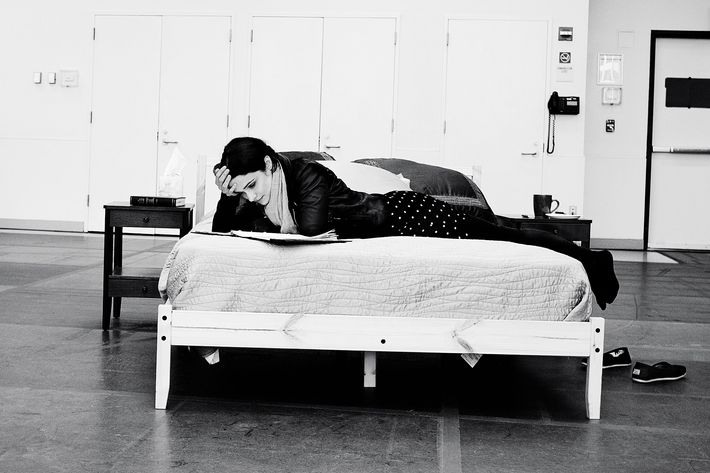
The prospect of Daniel Craig and Rachel Weisz—certifiably beautiful movie stars who happen to be married—appearing in a Broadway revival of Harold Pinter’s Betrayal under the direction of Mike Nichols (fresh from his Death of a Salesman with Philip Seymour Hoffman) is enough to quicken the blood, but there’s another prospect, almost as tantalizing: that the publicity-averse couple will finally be forced to sit side by side and talk about each other. About their swift and surprising union. How it feels to work together. How they manage to maintain a sphere of privacy. Tell us how you keep your secrets, Mr. and Mrs. Celebrity Couple. Spill.
The tabloid dream dies fast. I have to meet them on opposite sides of downtown, she in the West in an ordinary bakeshop (well, Le Pain Quotidien), he in the East in a hotel room he takes especially for our chat.
Before I see Craig, I ask Weisz about their refusal to be interviewed together. She professes surprise. “That is strange, isn’t it?” she says, of the publicist’s demand. “I don’t know why they did that.”
But didn’t she have a role in the decision?
“Y-y-yes. Yes.”
Pinteresque pause.
Maybe it was Craig’s call.
Later, he motions me into his hotel room. A compact man with a distractingly broad upper body, he suggests a bruiser even in repose, his blue eyes registering everything. The room seems too small for him—confining. But he’s congenial, more so than in most interviews. “People used to think I was particularly rude and obnoxious to journalists,” he says. “I’m only rude and obnoxious to journalists who ask me stupid questions.” My sense is neither he nor Weisz share their personal lives because neither is an especially good liar.
We talk Pinter before married life.
Craig plays Robert, whose wife, Emma (Weisz), has had a seven-year affair with his best friend, Jerry (Rafe Spall). Pinter began with an idea for scene one: the adulterers meeting for lunch after several years apart. He didn’t think there was anywhere to go from there and went backward instead, in stages, from the lovers’ break-up all the way to their first, drunken kiss. Hindsight proves unusually penetrating. Nearly everyone has betrayed everyone in ways large and small.
Craig’s congenital simmer makes the idea of his Pinter so exciting. His rhythms are his own. He knows that “Pinteresque” is an adjective and the playwright was exacting about pauses inserted as spaces for thought, but he won’t be bound: “I think if the pause doesn’t feel right, don’t do it,” he says. “He’s not around anymore, so it’s tough shit.”
There is, he feels, galvanic emotion under the ahs, cryptic silences, and gamesmanship. “With Pinter it’s usually about trying to get a reaction from the other person,” he says. “So, very contentious things come out of his character’s mouths. Not because they’re evil or bad. It’s just they want to feel loved.”
I mention that Pinter once advised American actors to say the lines and not agonize over motivation—to get the rhythm, the music. Craig shakes his head. “It may have beautiful meter and he may be a master craftsman but Pinter is an incredibly passionate man,” he says. “You hear how fucking difficult he could be with people and how passionate he felt about subjects away from theater—that’s my source of inspiration.”
Early this summer, Weisz, Craig, and Spall had a three-week workshop with Nichols. They did table reads, Nichols told stories about Pinter (he’d wanted to direct the eighties film of Betrayal), and they put the play on its feet. They laughed a lot. One suspects this will not be one of those arch, airless Pinter productions so easily parodied.
Spall tells me (from London, where he has just finished a movie and is busy with his kids, age two and ten months) that whenever there’s a hint of a gag in Pinter, it should be brought out. The son of British film and theater treasure Timothy, he was already steeped in Pinteriana before he won the role, devouring every play and essay as well as Lady Antonia Fraser’s recent memoir of her and Pinter’s (illicit) courtship and marriage, Must You Go? My Life With Harold Pinter.
But Betrayal still has its mysteries—and overintellectualizing Pinter is a fool’s game. “What Jerry knows and what he doesn’t is unclear at this moment,” says Spall. Craig anticipates thinking something different onstage every night. Weisz has purposely done no research on Pinter’s seven-year affair with British TV personality Joan Bakewell that inspired the play and is recounted in Bakewell’s memoir, The Centre of the Bed. (“Why not the left of the bed or right of the bed?” she asks. “It’s a threesome?”) She has few preconceptions, letting small discoveries in rehearsals build up. “It’s like layers of sediment,” she says, “which I’ll probably forget. But they’re there.”
She adds, “I’m making all this up as I go along. I have no theories. I’m trying to sound like I know what I’m talking about.”

For unclear reasons, Weisz has not been working much. Before her break-up with director Darren Aronofsky (with whom she shares custody of their son), she gave stupendous performances in Definitely Maybe, Agora, and The Whistleblower. None of those films were hits, however. Then came the bomb Dream House, an ordeal despite her bonding, so to speak, with her co-star, Craig—who for much of the shoot was infuriated by the studio’s insistence on adding cheap horror shocks. Her next performance, in Terence Davies’s The Deep Blue Sea, won her a surprise Best Actress award from the New York Film Critics Circle—but few people saw it. She went on to okay roles in two big films, a Bourne spinoff and Oz the Great and Powerful—then nothing for eighteen months.
That will change. She’s putting a film together based on Jennifer Gilmore’s novel The Mothers, which centers on the trials of adoption. And Betrayal will be a comeback: a return to the stage for the first time since her acclaimed Blanche in a 2009 London (Donmar Warehouse) production of A Streetcar Named Desire.
Craig and Weisz have places in London, Manhattan, and upstate, but they see themselves as New Yorkers. “It’s the strange thing that happens when you’ve been living somewhere long enough,” says Craig. “During Sandy, we were in London, and I wanted to get back. Very naturally, it’s become home.”
And—finally—the marriage? “We’re separate entities professionally, and we’re happy to stay separate entities, and we’re not a professional couple,” he says. ‘We just don’t want to be seen in that way: a couple. Because our relationship is nobody’s business but ours. We’re going on stage together, and we know we’re exposing ourselves, but we’re professionally exposing ourselves, which is what we do. What we do as actors.
“We’ll go to work, and we’ll do it, and we’ll go home. We may hit some problems, and there may be friction. Who knows? It could happen …
“Marriage is hard. Everybody has to work at it. And to have it exposed publicly doesn’t do it any favors. Personally I’m not interested in other people’s relationships. And it’s usually hearsay. It’s usually kind of wrong. Just to bring it back: Betrayal is about how what goes on in people’s marriages is far more complicated.”
Craig finishes a bag of chips and, having exhausted Pinter, is happy to chat about Bond. At the end of Betrayal’s fourteen-week run, he’ll be starting the next 007 film, once more with director Sam Mendes. Skyfall was an intense collaboration. The idea was always that Judi Dench’s M would die—a downer lifted by a late “humor pass” on the script. During filming they added more jokes. The shot where Bond leaps atop a speeding train in pursuit of a killer and straightens his cuffs: That came to Craig practically in mid-flight. “He’s really fucking hurt himself jumping on top of a train,” he says, “and he just wants to straighten himself up. That’s what it’s about: poise. To be more concerned about the way you look at the moment of crisis. The weirder the place it comes from the better it is.”
He had them reset the train (it took an hour) and do another take. Presto: an iconic image.
Craig’s Bond suffered mightily in three films but was, in effect, born again at the end of Skyfall—ready to take on the trappings and suits of 007 with less chafing. “Hopefully we’ll reclaim some of the old irony,” he says, “and make sure it doesn’t become pastiche. I can’t do shtick, I’m not very good at it. Unless it kind of suddenly makes sense. Does that make sense? I sometimes wish I hammed it up more, but I just can’t do it very well, so I don’t do it.”
One imagine—hopes—that playing Pinter with Weisz will require many such leaps onto moving trains over abysses. Only the trains will be wayward emotions, the abysses those pauses, the cuffs left unstraightened.


